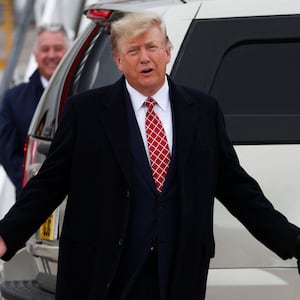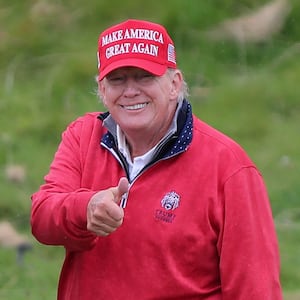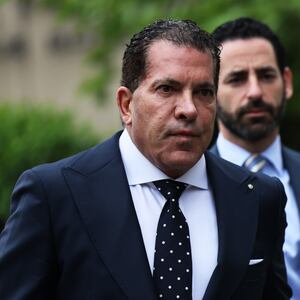The most damning witness at Donald Trump’s rape trial was the former president himself, E. Jean Carroll’s lead lawyer said in her final plea to a New York jury on Monday morning, recapping the former president’s long history of self-incriminating and misogynistic statements.
“No one, not even the former president, is above the law,” lawyer Roberta Kaplan said in her closing arguments. “In a real sense, Donald Trump is a witness against himself.”
Carroll’s legal team put together a one-hour presentation that showed the ugliest side of the real estate mogul, directly comparing his piggish boasting about his treatment of women to the present case, where nine jurors will decide whether Trump raped the advice columnist in the fitting room of a high-end Manhattan fashion store.
The most damning example came from the leaked 2005 Access Hollywood tape in which Trump was caught bragging about how celebrities like him can abuse their stardom to take advantage of women and “grab ’em by the pussy.” Kaplan compared that to the way he responded under oath during a deposition last year, when Trump told Kaplan that stars have long gotten away with it, “unfortunately—or fortunately.”
“He actually said fortunately?” Kaplan told the jury incredulously. “Let that sink in for a moment… he thinks stars like him can get away with it. And he thinks he can get away with it here,” she said.
“He grabbed her by the pussy—or vagina, excuse my language—and shoved his fingers inside her,” Kaplan later added, looking visibly uncomfortable.
Jurors were once again told that Carroll isn’t the only woman accusing him of sexual misconduct, even though she’s the only one suing. Jurors also heard in-person testimony from Jessica Leeds, a woman who said Trump groped and kissed her on a plane sometime around 1978, and Natasha Stoynoff, who said Trump attacked her at his Florida oceanside estate of Mar-a-Lago while she was on assignment there for People magazine in 2005.
Trump followed “the same playbook” that he described in the Access Hollywood tape, Kaplan told them. “He’s telling you in his very own words how he treats women,” she said.
For years, Trump’s go-to defense in this case has been that Carroll isn’t his “type.” And that made another piece of evidence all the more damning.
Jurors remained expressionless on Monday when Kaplan went over other evidence that made the courtroom crowd gasp earlier in the trial: the moment during Trump’s deposition when he embarrassingly viewed a photo of Carroll next to him at a party and misidentified her as his ex-wife Marla Maples. One of Trump’s lawyers in the case, Alina Habba, could be heard repeatedly interjecting to correct him in a hopeless effort to save her client.
“She was exactly his type. And believe it or not, he repeated it twice,” Kaplan told jurors. “Ms. Carroll, a former cheerleader and Ms. Indiana, was exactly his type.”
The lawyer reminded jurors that Carroll’s seemingly unexpected behavior—keeping the dress she had on during the alleged attack, watching The Apprentice on NBC despite it being Trump’s TV show, and often returning to shop at Bergdorf Goodman—made sense because doing the opposite would have forced her to acknowledge a traumatic experience she was trying to bury in her past for years.
Kaplan also ripped into Trump for skipping the trial, though she didn’t mention that he actually spent the time golfing in Ireland and Scotland while angrily posting on social media about his utter disdain for the case.
“You only saw him on video,” she said. “He didn’t even bother to show up here,”
Carroll’s team reminded jurors that they have two things to decide: if Trump raped the advice columnist when she was 52, and whether or not he defamed her in a Truth Social post last year.
However, in what may be the most surprising moment in her closing argument, Kaplan didn’t even mention how much money her side was asking for in terms of legal damages. Although a marketing expert during the trial guessed that it could cost anywhere from $1 million to $3 million to repair the damage to Carroll’s reputation, Kaplan didn’t even bring it up to the jury, opting instead to remind them that this case isn’t about the money.
When it was the other side's turn to make a final shot at convincing the jury, Trump's lead defense lawyer, Joe Tacopina, started by saying "no one's above the law, but no one's below it either."
He proceeded to deride the case as a "scam of a lawsuit" that "abused this system... for money, status, and political reasons," adopting Trump's go-to ridicule that this is nothing more than a "made up" story meant to harm his political standing.
"With no date, no month, no year, we can't call an alibi or a witness," he told them. "What they want is for you to hate him enough you'll ignore the facts, which make no sense."
Unable to ignore Trump's own damning admissions in the Access Hollywood tape, Tacopina said "it's rude, it's gross... but that doesn't make Ms. Carroll's unbelievable story believable."
Instead, he described the way that Carroll's case largely rested on the way she confided in two women back in 1996. Tacopina asked the jury to consider two scenarios and decide what's more likely: That she entrusted two people she barely knew back then with explicit details they kept secret for decades? Or that three women who eventually became close friends and abhorred Trump's politics hatched a plot together to fake a story about an incident that happened too long ago to disprove?
The crux of that theory relied on an email exchange between Carroll and one of those women, the former New York City local TV journalist Carol Martin, in which they complained about Trump.
"This has to stop. As soon as we're both well enuf to scheme, we must do our patriotic duty again," Martin wrote on Sept. 23, 2017.
"TOTALLY!!! I have something special for you when we meet," Carroll responded, a month before she started working on her tell-all book.
During the trial, Carroll's lawyers repeatedly claimed that was an innocent conversation that had nothing to do with actual scheming. But Tacopina appealed for jurors to use their "common sense."
"Scheme... it's a secret, a nefarious plan," he said, scoffing at the notion that the word would be used in a benign way. "Let's scheme to go to the library. let's scheme to go to the Yankee's game. We don't talk like that... scheme is exactly what you think it means."
In making the case that these three friends simply went along with a lie—one that went too far—Tacopina pointed to the way Martin expressed reservations about Carroll's campaign against Trump in a private text to another friend. Although Carroll's lawyers had previously tried to explain that the message lacked context, Tacopina continued to read it as "lethal" evidence of a conspiratorial plot.
Jurors were shown Martin's 2021 text where she wrote, "It's too hyperbolic. Too much celebratory stuff over something that hasn't really happened. She said she's gonna sue T when adult victims of rape law is passed in new York State or something. WTF."
"What the fuck! We're gonna sue him for rape that hasn't really happened?" Tacopina told the jurors. "They got caught... game, set, and match."
The day came to a close when another attorney on Carroll's team delivered their rebuttal that slammed Trump hard for not even showing up.
"This was never a 'he-said, she-said' case," Michael Ferrara remarked. "This was never even a 'he said,' because he never looked you in the eye and denied it."








